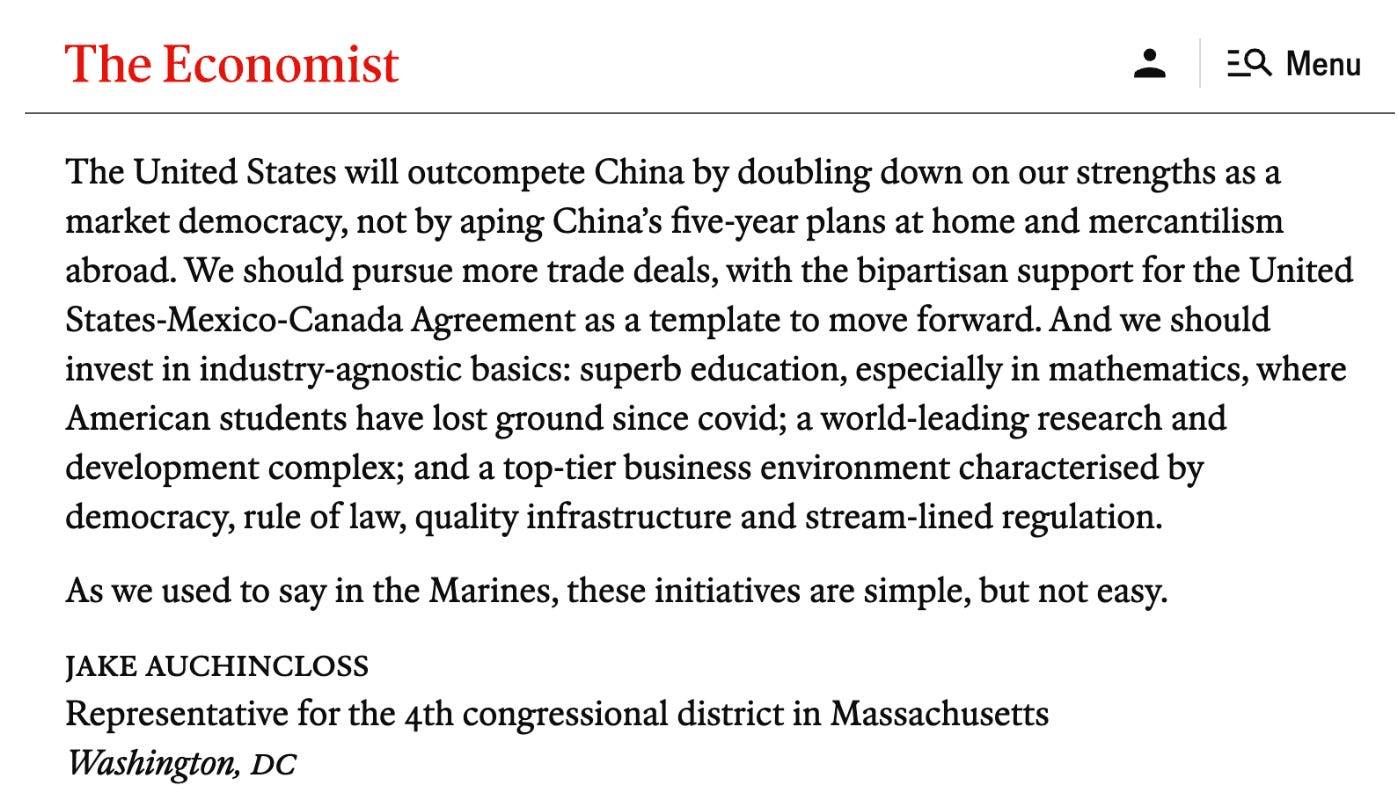Focus on trade gravity not trade deficits
The president’s tariffs saga continues. First, a trade court ruled that he overstepped in imposing them under emergency authority. Then, a federal appeals court reinstated them. The on-again, off-again tariffs are confusing businesses, exhausting allies, and increasing inflation.
Democrats, though, should not define our position on tariffs in reflexive opposition to Donald Trump’s. We should have our own point of view and plan for trade policy. We should emphasize free trade with free people; a more predictable and less political process; and economic diplomacy that pursues trade gravity. Trade gravity is my term for when the most rate-limiting and value-adding sections of a supply chain run through one economy.
More below on the three principles that define this policy:
Free trade with free people for free enterprise
Trade makes both countries richer. It’s not zero sum, with one country winning and the other losing, as Trump portrays it. It’s positive sum, due to comparative advantage. Free trade should be the default aim.
Sometimes, though, the default isn’t the right setting. In Xinjiang Province, China, for example, the Uyghur people, an ethnic minority, are coerced into nightmare working conditions. Congress banned trade with them.
Free trade should be with free people. Otherwise, capital is rewarded for exploiting workers that do not have any civil, environmental or labor protections. Tariffs can be an appropriate stick in carrot & stick diplomacy to induce other governments to improve those protections.
If not used judiciously, though, tariffs morph into protectionism. Industries focus on lobbying politicians for preference and protection, instead of competing (yes, globally) to build better products to earn greater market share.
With this president, such jockeying for influence has morphed quickly into corruption.
But even politicians of probity are rarely wiser than markets. Free enterprise is the bedrock of the American economy because it creates wealth, lowers prices, and improves the standard of living. U.S. companies should expect their government to uphold the rule of law, provide for the common defense, invest in public goods, and protect the general welfare, but they should not expect special treatment.
A letter to the editor of The Economist that I wrote as a Member of the Select Committee on China last term.
Congress regulates commerce with other countries, not the president
The International Emergency Economic Powers Act (IEEPA) gives the president too much latitude to set tariffs on a whim, by declaring an emergency. Democrats should seek to rescind this authority. Congress must reclaim its constitutional mandate to regulate commerce with other nations. Setting trade policy through Congress doesn’t prevent it from getting warped by lobbying and protectionism, but it at least stabilizes it, making it more predictable and transparent for business, allies, and families to plan around.
Geo-economic strategy should focus on supply-chain leverage, not trade deficits
As the next Democratic Congress sets trade policy with the next president, the focus should not be on bilateral trade deficits. Trade deficits make for good talking points but they do not address the geo-economic outcome that matters: more leverage over supply chains. (Nor do trade deficits tell you anything about prices or jobs.)
Take, for example, semiconductors. ASML, a Dutch multinational company, is the world’s most critical supplier to the semiconductor industry. Its lithography machines might be the most sophisticated instruments ever built; no one country could ever have built them alone. Because of its close economic partnership with the Netherlands and the European Union, the United States has a strong position within the lithography supply chain. When competing against China in the semiconductor industry, this position is what has provided the most leverage.
As America and China race each other to invent and build new industries, U.S. trade strategists should seek deals that optimize America’s position as the hub of a global network of supply chains. We should seek trade gravity, not trade surpluses.




Strategic. Logical. Get the party to embrace and message!
Finally a democrat offering solutions and stating a position.